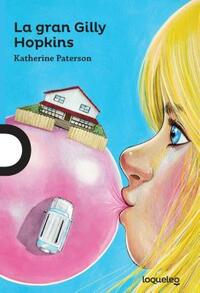Take a photo of a barcode or cover
I appreciated that the ending wasnt nicely tied up.
emotional
funny
sad
medium-paced
I liked how realistic this book was and I actually appreciated the way it ended. No fluffed up happy ending, but a truly believable story.
Gilly is a hustler - smart and spunky and angry, yet still likeable. I appreciated that she was vicious in her efforts to take care of herself and establish a reputation in order to prevent bullying or mocking - I feel like it makes it more true to many foster children's experiences. I loved Trotter and Ms. Harris, their characters were brilliant combinations of flaws and compassion and wisdom.
I love Katherine Paterson's way of writing about gritty, real, complex issues on a level that is truthful yet accessible for young readers. You can feel her compassion for every character in this novel. The story touches on racism, prejudice, compassion, forgiveness, the foster system, abandonment, and belonging.
I love Katherine Paterson's way of writing about gritty, real, complex issues on a level that is truthful yet accessible for young readers. You can feel her compassion for every character in this novel. The story touches on racism, prejudice, compassion, forgiveness, the foster system, abandonment, and belonging.
This book was lying around my house so I decided to read it as a quick palate cleanser between other, harder books. It made me cry my face off. I think that's Katherine Paterson's thing.
The protagonist, Galadriel "Gilly" Hopkins, is rather a horrible child. Abandoned by her mother, she's been messed around by the system and various nasty foster parents until she's almost a lost cause. Her social worker finally puts her with Trotter, the foster mother of last resort. Trotter is a huge, messy woman who lives in a huge, messy house with a small, possibly developmentally delayed foster son name William Earnest and a black neighbour. Snobby, racist Gilly is disgusted by this turn of events.
The book concerns Gilly's change of heart about her new foster family (and foster neighbour) — and how she manages to catastrophically screw it all up anyway.
I love that Paterson lets the catastrophic screw-up stand, and shows how Gilly recovers and uses what she learns at Trotter's house to figure out how to survive in her latest new life.
The protagonist, Galadriel "Gilly" Hopkins, is rather a horrible child. Abandoned by her mother, she's been messed around by the system and various nasty foster parents until she's almost a lost cause. Her social worker finally puts her with Trotter, the foster mother of last resort. Trotter is a huge, messy woman who lives in a huge, messy house with a small, possibly developmentally delayed foster son name William Earnest and a black neighbour. Snobby, racist Gilly is disgusted by this turn of events.
The book concerns Gilly's change of heart about her new foster family (and foster neighbour) — and how she manages to catastrophically screw it all up anyway.
I love that Paterson lets the catastrophic screw-up stand, and shows how Gilly recovers and uses what she learns at Trotter's house to figure out how to survive in her latest new life.
emotional
funny
hopeful
lighthearted
reflective
medium-paced
Plot or Character Driven:
Character
Strong character development:
Yes
Loveable characters:
Yes
Diverse cast of characters:
Complicated
Flaws of characters a main focus:
Yes
I remember reading this book for school in sixth grade when I was a child. All I had was a vague recollection of a child who was in the foster care system, which is relevant to my position now as an adoption caseworker. I remembered it being about a smart, (and smart aleck) kid, who had difficulty attaching to others, because she had been shuffled around so much.
This was a quick read, but for some reason, I must have blocked out the ending, because I had always remembered it as having a happy ending. That is not the case. The ending was surprisingly existential, and to my mind, a very cynical book for a sixth grader. However, still a good, relevant read.
This book has made me rethink many of the other stories I read as a child, and if I see them with new eyes, 25 years later.
This was a quick read, but for some reason, I must have blocked out the ending, because I had always remembered it as having a happy ending. That is not the case. The ending was surprisingly existential, and to my mind, a very cynical book for a sixth grader. However, still a good, relevant read.
This book has made me rethink many of the other stories I read as a child, and if I see them with new eyes, 25 years later.
I adored this book. As she did in [b:Bridge to Terabithia|2839|Bridge to Terabithia|Katherine Paterson|http://photo.goodreads.com/books/1327880087s/2839.jpg|2237401], Katherine Paterson does a masterful job of dealing with tough themes in an appropriate way for middle grade readers. And her characters are always real and full of depth--and Gilly is no exception! 11-year-old Gilly Hopkins is as tough and mean as they come. She is moving on to her fourth foster placement as the book begins, and upon meeting the strange Mrs. Trotter and her foster brother William Ernest, she vows to make their lives miserable. And then she can put a plan in place so that her real mother will come to her rescue...but will she?
Even through all her hurt and anger, I loved Gilly. Though her situation is unusual, I still think this is a book that many kids will enjoy and relate to--who hasn't felt mistreated, angry, or alone at some point? Paterson does an amazing job of showing Gilly's transformation and arc of character development throughout the book. Minor characters were well-developed and multi-dimensional as well. There are some adult themes, such as racism (a version of the n-word is used once or twice) and child abandonment, so I would recommend this book more for middle grade readers, ages 11 and up. This is the touching (I teared up more than a few times!) and heartfelt story of the Great Gilly--you will not be disappointed if you take her on!
Even through all her hurt and anger, I loved Gilly. Though her situation is unusual, I still think this is a book that many kids will enjoy and relate to--who hasn't felt mistreated, angry, or alone at some point? Paterson does an amazing job of showing Gilly's transformation and arc of character development throughout the book. Minor characters were well-developed and multi-dimensional as well. There are some adult themes, such as racism (a version of the n-word is used once or twice) and child abandonment, so I would recommend this book more for middle grade readers, ages 11 and up. This is the touching (I teared up more than a few times!) and heartfelt story of the Great Gilly--you will not be disappointed if you take her on!
I had seen this book sitting around my older sister's bookshelf for a few years before I had actually picked it up and read it. During my younger years I was really in a mode of "judging a book by it's cover" and I really did not like the cover of this book. Gilly Hopkins seemed rude and annoying and just plain mean, and that I got just by looking at her!
But when I finally read the book I really enjoyed it. I stepped into the shoes of her foster life and while I always thought I was smarter than she was I couldn't help but admire her spunk and spirit. I really felt bad for her when her mother wrote her letters, raised her hopes up again of having 'the perfect life' and then let her down time after time.
But by the end of the book her predicaments had gotten better, and thus the happy ending really uplifted my own spirits. It was a very good read as a child!
But when I finally read the book I really enjoyed it. I stepped into the shoes of her foster life and while I always thought I was smarter than she was I couldn't help but admire her spunk and spirit. I really felt bad for her when her mother wrote her letters, raised her hopes up again of having 'the perfect life' and then let her down time after time.
But by the end of the book her predicaments had gotten better, and thus the happy ending really uplifted my own spirits. It was a very good read as a child!







